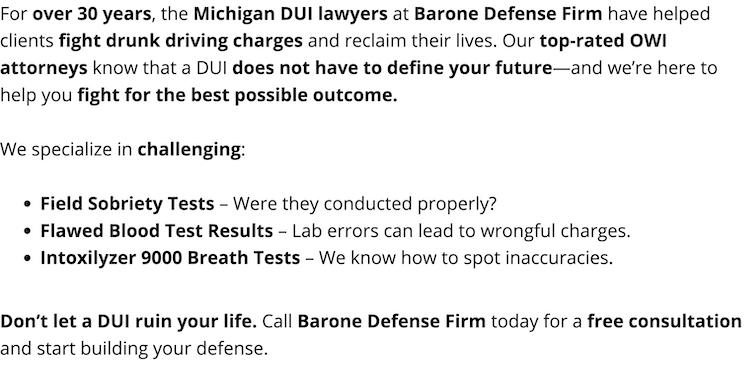Michigan DUI Sobriety Court
In Michigan, if you have been found guilty of drunk driving within the last seven years and are arrested for a second OWI offense, you may be eligible for sobriety court. Generally, participation in a sobriety court program will not reduce your sentence in any significant way; however, it can be very beneficial in addressing underlying problems such as alcohol and substance abuse.
Sobriety Court Locations Offered
In Michigan, sobriety court is an option available to repeat OWI offenders who need help overcoming alcoholism or substance addiction. Sobriety court essentially is an intense form of probation that focuses on recovery from substance abuse. Rather than simply punish the offender, sobriety court can actually help an alcoholic or addict overcome their problem.
Sobriety court participants must agree to random home visits and take part in group and/or individual counseling sessions and Alcoholics Anonymous meetings. Additionally, participants must go before the sobriety court judge for a review hearing every two weeks. Participants are also responsible for all program costs, which can total $2,000 or more.
The legislative intent was to encourage sobriety courts and, in general, sobriety courts put the emphasis in the right place, meaning it puts the emphasis on sobriety and on rehabilitation rather than punishment. The problem is partly funding and partly personality, I think, of the various judges. Some judges do not really have the interest in being what is effectively a social worker. Because the sobriety court requires the judge to sit on the bench not in an adversarial, the judge is never in an adversarial position as such, but what is happening in the court room is not adversarial, the judge is just sitting there assisting what is really almost like a group recovery meeting.
Who Qualifies for it?
Not every district or circuit court has a sobriety court program. For those that do, you must still quality and be eligible for participation, and this eligibility varies somewhat depending on the court. In general however, order to be eligible for sobriety court, you must be convicted of at least two drunk driving offenses. Further eligibility requirements vary by county and usually include minimum residence requirements. You may not be eligible if you have any criminal felony convictions on your record.
Benefits of Sobriety Court
Sobriety courts are designed to help repeat drunk driving offenders address underlying substance abuse issues. In this way, they are very much like other addiction recovery groups, and the sobriety courts currently offered in Michigan have been successful in helping people overcome substance abuse problems.
Another potential benefit is the opportunity to get your drivers license back sooner than would otherwise be possible. Typically, a second drunk driving offense within seven years results in a one-year suspension of your driver's license; however, if you are enrolled in sobriety court, you may be able to get your license back after just 45 days, although you will be required to install an ignition interlock device in your vehicle.
Downsides to Sobriety Court
One of the biggest downsides to sobriety court is that participants often are required to give up certain Constitutional rights. For instance, if you are enrolled in a sobriety court program, the police or your probation officer may come to your home without a warrant to search for alcohol.
Another problem with sobriety court is that it involves a great deal of drug and alcohol testing, which can become an expensive burden for the participant to bear.
Future of Sobriety Court
The legislative intent was to encourage sobriety courts and, in general, sobriety courts put the emphasis in the right place, meaning it puts the emphasis on sobriety and on rehabilitation rather than punishment. The problem is partly funding and partly personality of the various judges.
Some judges don't really have the interest in being what is effectively a social worker. Because the sobriety court requires the judge to sit on the bench not in an adversarial, the judge is never in an adversarial position as such, but what's happening in the court room is not adversarial, the judge is just sitting there assisting what is really almost like a group recovery meeting.
 Barone Defense Firm Home
Barone Defense Firm Home
















